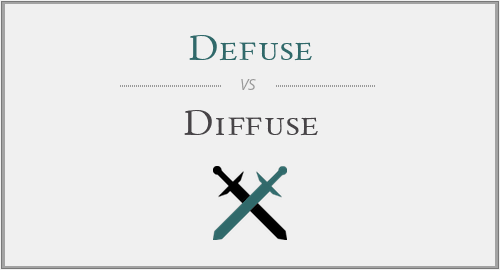The bomb squad defused the bomb and contained the gas before it diffused in the air.
English as a language never stops to amaze its learners. As easy as it might be, there are times when you find yourself panicking about what meant what as the words are just so much alike that you can’t tell them apart. Defuse and diffuse are a word pair of English language which are almost homophones, i.e. they have similar sounds but very different meanings and spellings. The massive differences in their meanings make defuse and diffuse unrelated and un-substitutable with each other.
The sentence at the beginning of the article makes use of both the words in their most common meanings and context. This article will help you how to tell them apart and when to use which homophone, without making a mistake.
Diffuse as verb:
Originated from Latin (diffundere meaning extensive) many centuries ago, diffuse is used as a verb in English language where it means to spread over a wide area or between a large number of people. The advances in technology diffused rapidly over the last century. Diffuse is also a phenomenon of physics which implies intermingle with another substance by movement, typically in a specified direction or at specified speed. The molecules of oxygen diffuse across the membrane during gaseous exchange. Diffuse is also used when something cause light to spread evenly to reduce glare and harsh shadows.
The prism diffuse the light rays at a specific angle.
Diffuse as adjective:
Another way in which diffuse is used is as an adjective where is describes the noun. The most common definition of diffuse as adjective is when something spreads out over a large area or is not concentrated. The diffuse community was only centered in the church. Diffuse is also utilized in the medical world where is denotes a disease which is not localized in the body. The patient has got diffused hyperplasia, he will very likely make it. Diffuse is also used as an adjective when it defines a thing or person lacking clarity or conciseness.
The second argument is more diffuse than the first one.
Defuse as verb:
The most common use of defuse as a verb is when it implies to remove the fuse from (an explosive device) in order to prevent it from exploding. The explosive specialist training requires the trainers to defuse the bomb in a violent situation. With synonyms like deactivate, disarm and disable, defuse is a well-known phenomenon. Defuse is also employed as a verb where it means to make a situation lesstense or dangerous.
We are looking for a scheme that teaches officers how to defuse potentially explosive situations.

Examples:
If someone started a fight, he was the one who would defuse the situation. (The World Link)
Alice Springs police were called to an Indigenous camp yesterday to defuse threats of a violent riot. (ICNN)
The benefits of globalisation have been diffuse while its downsides have largely been isolated. (The National)
It is about 1.5 times as wide as Jupiter, but only about a tenth as dense, making it one of the most diffuse planets yet found. (New Scientist)
We’ll look at ideas to diffuse the sound or bounce it away. (Brooklyn Paper)
There is nothing here to diffuse the focus: it’s on Porsches, everywhere, all the time. (NY Times)
Diffuse or defuse:
Diffusion is the opposite of “fusion,” which means a coming together of elements so diffusion is the spreading apart of elements. Defuse is the act of de-fusing i.e. removing a fuse from the bomb. Defuse is used when you are removing “de fuse” from an explosive situation—remove “de fuse.” Otherwise, it could blow up, and everything in sight would be diffused in an instant.




Have a discussion about this article with the community:
Report Comment
We're doing our best to make sure our content is useful, accurate and safe.
If by any chance you spot an inappropriate comment while navigating through our website please use this form to let us know, and we'll take care of it shortly.
Attachment
You need to be logged in to favorite.
Log In